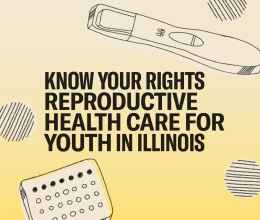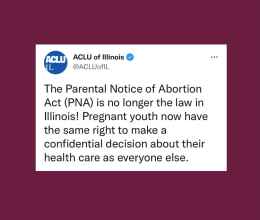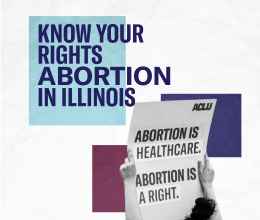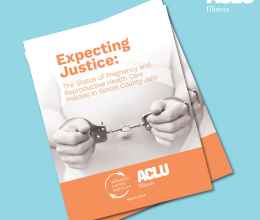
CHICAGO – The Illinois Supreme Court is set to hear oral arguments today in Springfield in the case of Hope Clinic v. Adams, a challenge to the never-enforced Parental Notification of Abortion Act of 1995. Lawyers for the ACLU of Illinois, representing the plaintiffs, will tell the Court that the law does real harm to young women from dysfunctional families and is based almost entirely on flawed, outdated data that other state courts have rejected. The reality is that most young women inform and involve a parent or trusted adult when making the decision to terminate a pregnancy. When they do not inform a parent or adult, they have a good reason – because they fear physical or mental abuse.
The case comes to the Supreme Court after an appellate court ruled that a circuit court erred in refusing to permit the plaintiffs to present evidence concerning the law’s violation of the Illinois Constitution’s equal protection, privacy, due process and gender equality provisions. Because of state and federal court injunctions, the law has never been enforced.
“As the circuit court noted earlier in this case, this law poses real harm to some young women facing an unplanned pregnancy,” said Lorie Chaiten, director of the ACLU of Illinois Reproductive Rights Project who will present the oral argument on Thursday. “Forced parental notification will cause some young women to suffer physical and mental abuse, be kicked out of their home or forced to carry the pregnancy to term against their will.”
The ACLU of Illinois will present an argument pointing to the lack of justification in imposing these onerous restrictions on young women. Illinois law permits (and has since the early 1960s) pregnant minors to make all other medical decisions without forced parental involvement, except for the decision to terminate a pregnancy. A pregnant minor can make her own decisions about undergoing invasive medical procedures, carrying a pregnancy to term, choosing to parent or giving the child up for adoption, all without parental notice or involvement. Only if she decides to terminate her pregnancy does the state force a parent or the court into the decision.
The plaintiffs also will tell the Court that the asserted purposes offered by the General Assembly in passing the law in 1995 simply do not withstand scrutiny in light of the overwhelming body of current scientific research. For example, the language of Illinois’ parental notification law suggests that young women suffer physical and psychological harms from abortion and that young women are incapable of making informed medical decisions.
The body of scientific literature from leading medical, psychological and public health authorities demonstrates that these assumptions – made by the legislature in passing this law – are wrong. The best research from the leading authorities shows that young women who terminate their pregnancies are as healthy – or healthier – from a psychological perspective than those who chose to carry a pregnancy to term.
The ACLU notes that recent studies also disprove the notion that young women lack the ability to make an informed decision about carrying a pregnancy to term. In Massachusetts, for example, which long has forced parental involvement in abortion decisions on its minors, nearly all (98%) of the young women who have sought a court’s waiver of the parental involvement requirement have obtained such orders because the court concludes that they are mature enough and well-enough informed to make an informed medical choice.
“When other state courts have looked at the evidence we intend to present to the court, they have rejected these forced parental involvement schemes under those state constitutions,” added the ACLU’s Chaiten. “We are confident that the Illinois Supreme Court will rule in our favor and permit us to proceed to trial where we can demonstrate the unjustified and harmful impact of the state’s discriminatory classification of young women based on their abortion decisions.”
The ACLU of Illinois and the National ACLU Reproductive Freedom Project are being assisted in this matter by Rachel Niewoehner and Geeta Malhotra of the Chicago office of Sidley Austin LLP.





